Related Research Articles
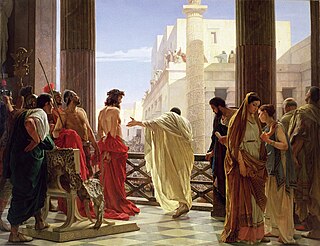
Pontius Pilate was the fifth governor of the Roman province of Judaea, serving under Emperor Tiberius from 26/27 to 36/37 AD. He is best known for being the official who presided over the trial of Jesus and ultimately ordered his crucifixion. Pilate's importance in modern Christianity is underscored by his prominent place in both the Apostles' and Nicene Creeds. Due to the Gospels' portrayal of Pilate as reluctant to execute Jesus, the Ethiopian Church believes that Pilate became a Christian and venerates him as both a martyr and a saint, a belief which is historically shared by the Coptic Church.
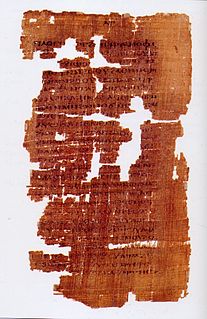
The Gospel of Nicodemus, also known as the Acts of Pilate, is an apocryphal gospel claimed to have been derived from an original Hebrew work written by Nicodemus, who appears in the Gospel of John as an associate of Jesus. The title "Gospel of Nicodemus" is medieval in origin. The dates of its accreted sections are uncertain, but the work in its existing form is thought to date to around the 4th or 5th century AD.

The stolen body hypothesis posits that the body of Jesus Christ was stolen from his burial place. His tomb was found empty not because he was resurrected, but because the body had been hidden somewhere else by the apostles or unknown persons. Both the stolen body hypothesis and the debate over it presume the basic historicity of the gospel accounts of the tomb discovery. The stolen body hypothesis finds the idea that the body was not in the tomb plausible – such a claim could be checked if early Christians made it – but considers it more likely that early Christians had been misled into believing the resurrection by the theft of Jesus's body.

Luke 3 is the third chapter of the Gospel of Luke in the New Testament of the Christian Bible, traditionally attributed to Luke the Evangelist, a companion of Paul the Apostle on his missionary journeys. It contains an account of the preaching of John the Baptist as well as a genealogy of Jesus. The Expositor's Greek Testament states that in this chapter "the ministry of the new era opens".

Matthew 28 is the twenty-eighth and final chapter of the Gospel of Matthew in the New Testament. This chapter records that Jesus is risen, describes the actions of the first witnesses to this event, and ends with the Great Commission.
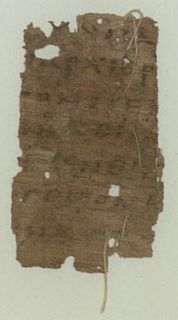
Matthew 27 is the 27th chapter in the Gospel of Matthew, part of the New Testament in the Christian Bible. This chapter contains Matthew's record of the day of the trial, crucifixion and burial of Jesus. Scottish theologian William Robertson Nicoll notes that "the record of this single day is very nearly one-ninth of the whole book".
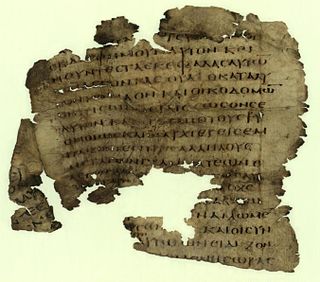
Mark 15 is the fifteenth chapter of the Gospel of Mark in the New Testament of the Christian Bible. This chapter records the narrative of Jesus' passion, including his trial before Pontius Pilate and then his crucifixion, death and entombment. Jesus' trial before Pilate and his crucifixion, death, and burial are also recorded in Matthew 27, Luke 23, and John 18:28–19:42.
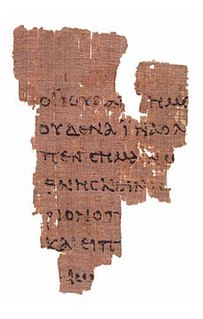
John 18 is the eighteenth chapter of the Gospel of John in the New Testament of the Christian Bible. This chapter records the events on the day of the Crucifixion of Jesus, starting with the arrest of Jesus the evening before. The three denials of Peter are interwoven into the narrative concerning the trials of Jesus.

In the New Testament, the Sanhedrin trial of Jesus refers to the trial of Jesus before the Sanhedrin following his arrest in Jerusalem and prior to the trial before Pontius Pilate. It is an incident reported by all three Synoptic Gospels of the New Testament, while the Gospel of John refers to a preliminary inquiry before Annas. The gospel accounts vary on a number of details but are identical in essence.
Matthew 28:11 is the eleventh verse of the twenty-eighth chapter of the Gospel of Matthew in the New Testament. This verse is part of the resurrection narrative. In this verse some of the guards at the tomb return to Jerusalem to report to the chief priests.
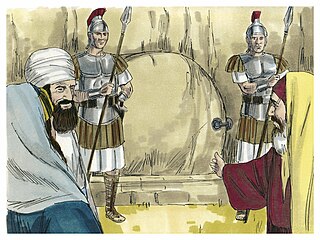
Matthew 27:65–66 are the final two verses of the twenty-seventh chapter of the Gospel of Matthew in the New Testament, coming after the crucifixion and entombment of Jesus. The chief priests and the Pharisees meet with Pontius Pilate, and he approves their request for a tomb guard.

Matthew 27:64 is the sixty-fourth verse of the twenty-seventh chapter of the Gospel of Matthew in the New Testament. This verse occurs after the crucifixion and entombment of Jesus. In it the chief priests and the Pharisees, who are meeting with Pontius Pilate, ask for a guard for the tomb.
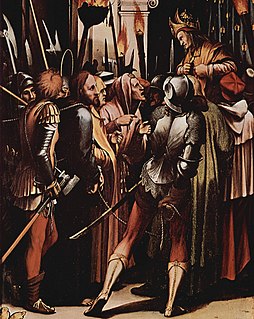
Matthew 27:62 is the sixty-second verse of the twenty-seventh chapter of the Gospel of Matthew in the New Testament. This verse occurs after the crucifixion and entombment of Jesus. In it the leaders of the Jewish community meet with Pontius Pilate.
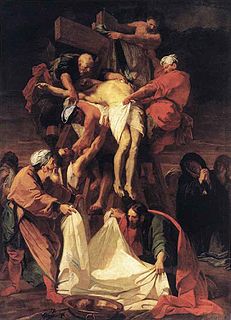
Matthew 27:59 is the fifty-ninth verse of the twenty-seventh chapter of the Gospel of Matthew in the New Testament. This verse describes Joseph of Arimathea gathering Jesus' body after the crucifixion.
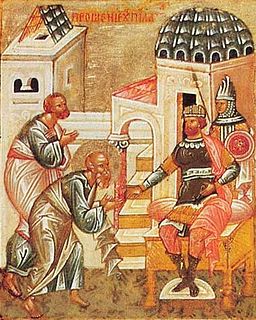
Matthew 27:58 is the fifty-eighth verse of the twenty-seventh chapter of the Gospel of Matthew in the New Testament. This verse describes Joseph of Arimathea meeting with Pontius Pilate to secure the burial of Jesus.

Matthew 27:11 is the eleventh verse of the twenty-seventh chapter of the Gospel of Matthew in the New Testament. This verse brings the narrative back to Pilate's Court, and the final trial of Jesus.

Matthew 27:2 is the second verse of the twenty-seventh chapter of the twenty-seventh chapter of the Gospel of Matthew in the New Testament. Jesus has just seen condemned by the Jewish Sanhedrin, and in this verse is presented to Pontius Pilate.

The crucifixion darkness is an episode in three of the canonical gospels in which the sky becomes dark in daytime during the crucifixion of Jesus for roughly three hours. Most ancient and medieval Christian writers treated this as a miracle, and believed it to be one of the few episodes from the New Testament which were confirmed by non-Christian sources; modern scholars, however, have found no contemporary references to it outside the New Testament.
Passion Gospels are early Christian texts that either mostly or exclusively relate to the last events of Jesus' life: the Passion of Jesus. They are generally classed as New Testament apocrypha. The last chapters of the four canonical gospels include Passion narratives, but later Christians hungered for more details. Just as infancy gospels expanded the stories of young Jesus, Passion Gospels expanded the story of Jesus's arrest, trial, execution, resurrection, and the aftermath. These documents usually claimed to be written by a participant mentioned in the gospels, with Nicodemus, Pontius Pilate, and Joseph of Arimathea as popular choices for author. These documents are considered more legendary than historical, however, and were not included in the eventual Canon of the New Testament.
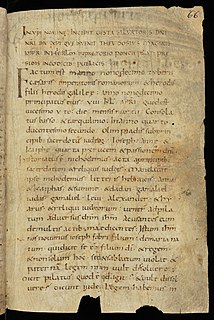
The Pilate cycle is a group of various pieces of early Christian literature that purport to either be written by Pontius Pilate, or else otherwise closely describe his activities and the Passion of Jesus. Unlike the four gospels, these later writings were not canonized in the New Testament, and hence relegated to a status of apocrypha. Some writings were quite obscure, with only a few ancient textual references known today; they merely survived through happenstance, and may not have been particularly widely read by early Christians in the Roman Empire and Christians in the Middle Ages. Others were more popular. The most notable example was the Gospel of Nicodemus, which proved quite popular and influential in medieval and Renaissance Christianity.
References
- ↑ Greek Text Analysis: Matthew 28:14. Biblehub
- ↑ Matthew 28:14. The Treasury of Scripture Knowledge cross reference: Acts 12:19. Quote: And when Herod had sought for him [Peter], and found him not, he examined the keepers, and commanded that they should be put to death. And he went down from Judaea to Caesarea, and there abode. (KJV)
- ↑ Phillips, John (2005). Exploring the Gospel of Matthew: An Expository Commentary. The John Phillips Commentary Series. Vol. 1 (reprint ed.). Kregel Academic. p. 125. ISBN 9780825433924.
- ↑ France 2007, p. 1104.
- ↑ France 2007, p. 1106.
- ↑ France 2007, pp. 1103–1104.
- ↑ Eusebius, Chronicles Book II, chapter 2. Quote: Chapter 2. How Tiberius was affected when informed by Pilate concerning Christ. 1. And when the wonderful resurrection and ascension of our Saviour were already reported abroad, in accordance with an ancient custom which prevailed among the rulers of the provinces, of reporting to the emperor the novel occurrences which took place in them, in order that nothing might escape him, Pontius Pilate informed Tiberius of the reports which were reported abroad through all Palestine concerning the resurrection of our Saviour Jesus from the dead.
- ↑ Exell, Joseph S.; Spence-Jones, Henry Donald Maurice (Editors). On "Matthew 28". In: The Pulpit Commentary . 23 volumes. First publication: 1890. Accessed 24 April 2019.
- ↑ Tertullian, Apologeticus, chapter V. Quote: By virtue of this old decree it was that Tiberius, in whose reign Christianity came into the world, having received intelligence from Judea about the miracles of Christ, proposed it to the senate, and used his prerogative for getting Him enrolled among the number of their gods. The senate, indeed, refused the proposal, as having not maturely weighed His qualifications for a deity; but Caesar stood to his resolution, and issued out severe penalties against all who should accuse the worshippers of Christ. Source: The Apology of Tertullian, translated and annotated by William Reeve (1709 reprinted 1889).